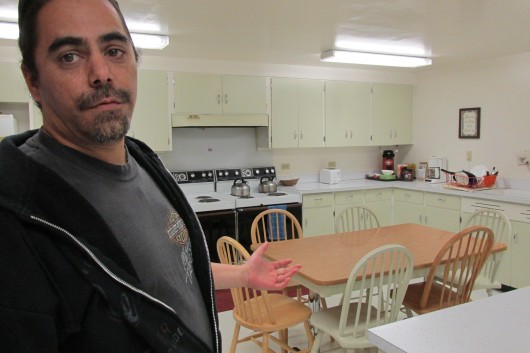
First City Homeless Shelter’s service manager Chris Alvarado makes breakfast each weekday for homeless and hungry people in the day shelter kitchen. The day shelter recently got a grant from the borough that will allow the day shelter to stay open Saturdays.
Ketchikan’s Seeking Community Homeless Solutions Task Force published its goals for the next decade earlier this month. A big part of that plan is a solution to serving homeless families, not just single men and women who need temporary shelter.
There are about half a dozen men at the First City Homeless Shelter on a Wednesday afternoon. One reads the newspaper, three are watching an action-adventure movie and another browses the Internet. Chris Alvarado is the service manager for the day shelter.
“I guess before, the only place these guys would go during the day would be the library. They’d hang out at the library there in the front. People didn’t really want them round there,” Alvarado said. “A lot of times people don’t want people who are homeless and intoxicated, or not even intoxicated but they haven’t had a shower in a couple of days. They kind of down look at them. The thing is they’re still human beings and we’re here to provide shelter to keep these guys alive and to make sure they have somewhere to go.”
First City Homeless Shelter is one of a handful of homeless services in Ketchikan. Last month, it saw 75 different clients who signed in a total of 362 times.
The services available in the community are pretty dynamic. A homeless or hungry person can get two meals a day five days a week between the day shelter and the Salvation Army, and they can find a place to stay during both day and night between the day shelter and Park Avenue Temporary Housing, which offers nighttime shelter for homeless people.
But are there enough services to support the homeless community in Ketchikan? Evelyn Erbele is the chair of the day shelter’s board. She said
on the most basic level, there are.
Depends on what you mean by services. The answer off the top would be yes, in that there is shelter for anyone who is homeless or marginally housed,” Erbele said.
Lisa Scarborough is executive director of Love in Action, and she’s part of the Ketchikan Wellness Coalition’s Seeking Community Homeless Solutions Task Force. She says there are three types of homeless people in Ketchikan: indigent homeless, who suffer from chronic mental illnesses or substance abuse addictions; transient homeless who come to work and run out of money or resources and “get stuck;” and families who live and work here but are at risk of homelessness or already live in their cars or boats or in the homes of friends and family.
Services for homeless families is where Ketchikan is lacking, Scarborough said.
“It’s really just kind of a mess because there’s no family shelter in Ketchikan. There’s nowhere for people to go unless you’re a woman with children that can get into WISH. If you’re a single male with children or a family that doesn’t want to separate, there’s nowhere for you to go,” Scarborough said. “We realize that it’s the families in our community people with children and teens that are couch surfing – those are the needs that are not being met in the community right now.”
Though First City Homeless Shelter and Park Avenue Temporary Housing night shelter are both physically able to take in families, Scarborough says the environment can be unsuitable for families, because there is no way to isolate them from people with mental illnesses or substance-abuse issues.
“There’s no separation, there’s no extra place for them to go. It’s just one big open space,” Scarborough said.
And that’s what the task force aims to bring to the community – a comprehensive 24-7 shelter that can offer a safe place and services to all types of homeless people.
“Our task force hope is we can combine all the services into one facility, where we can divide it off by floors, so that men can have their own space, women and children can have their own space, people with disabilities would have space too where they would be able to enter without having to go up and down stairs. Into one building, that would be our hope,” Scarborough said.
The task force is in the process of identifying a building to rent and to get the program established, but that’s easier said than done. Scarborough says the best case scenario would have the comprehensive program up and running by the end of 2015 or early 2016.
This article has been edited to correct an error. Park Avenue Temporary Housing does not allow clients to use the shelter if they are under the influence of drugs or alcohol.





